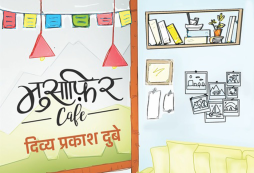
A REMIX
There is a type of female stock character, often used in cinema, referred to as the Manic Pixie Dream Girl (MPDG). Free-spirited, eccentric and often self-destructive, this character exists to teach life lessons to the main character, often a brooding, soulful male protagonist. In Musafir Café, Divya Prakash Dubey uses, not one but two such characters. The two females sweep in one after the other and deliver the “hero” to his dreamy aspiration—leaving his nine to five job in the city to set up a “travellers café” in the hills.
Dubey borrows the names of characters from the highly popular 60’s novel, Gunahon ka Devta. He retains the basic plot while modernizing the story to reflect current times. Unlike the submissive and tragic heroine of the older novel, the women in Dubey’s story have careers and are independent. Also, in tune with today’s urban milieu, men and women seek marriage partners online and premarital relationships are commonplace. The author, however, creates an unrealistically emancipated world where single mothers and live-in relationships come without any practical problems or social constraints. The modern twist has a farcical end with the male protagonist Chander living in harmony with the two women he loves running a free hotel for travelers in Mussorie.
The airy and periphrastic storytelling that lends well to sentimental videos that Dubey creates for YouTube becomes tedious in a book. The characters in Musafir Cafe, too, remain silhouettes throughout the novel as the author fails to dive into their inner thoughts and feelings.
Narrative drive is the quality in writing that keeps the reader riveted. While dispensing measured information about the character and plot plays an important role for interesting storytelling, any forced attempt to create irony or suspense by withholding information that the protagonist already knows from readers leads to loss in the narrative drive. In Musafir café the fact that Chander knows that he has a son is concealed from the reader. This feels unnatural and more like a ploy to dupe the reader.
The Musafir Café feels like a forgettable “remixed “song—a vintage track set on new music while cashing on popular nostalgia.
